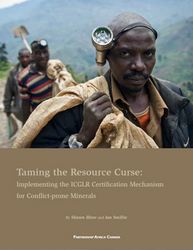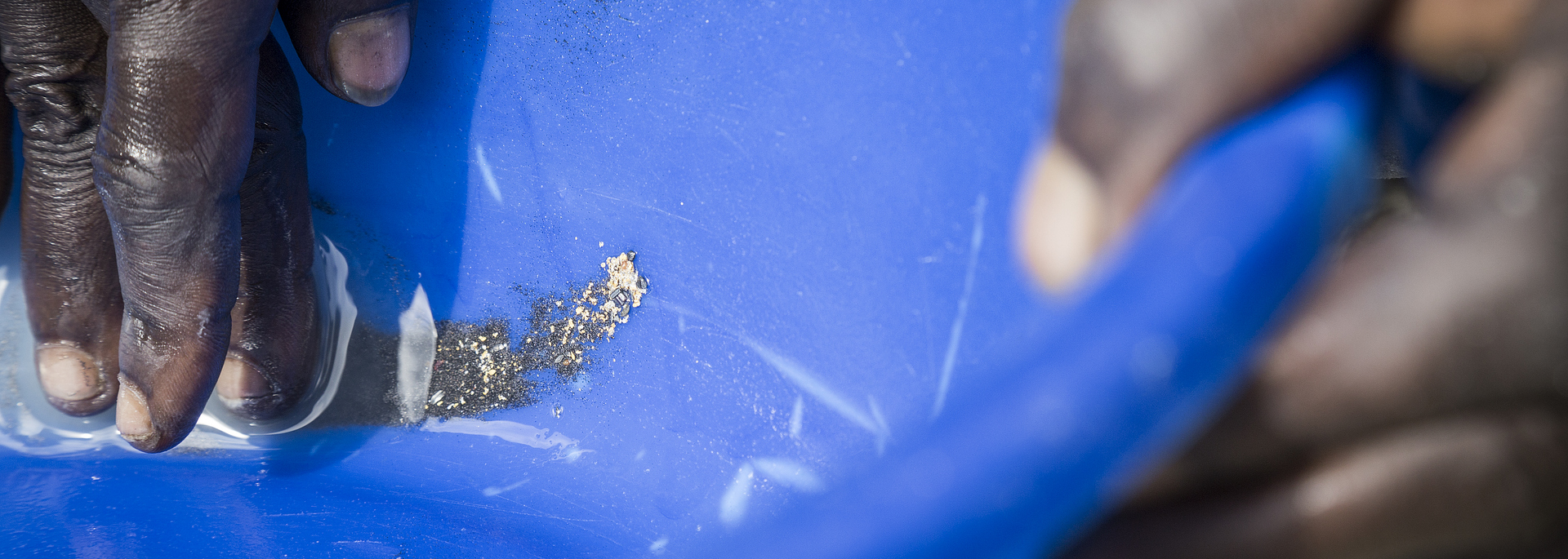
IMPACT in Democratic Republic of Congo
Our work in DRC focuses on providing technical guidance to develop new approaches to natural resource management. IMPACT has field operations in DRC implementing the Just Gold project, as well as our Francophone team for the Great Lakes region is based in the country. We have offices in Kinshasa, as well as Ituri Province—Bunia and Mambasa.
The Democratic Republic of Congo (DRC) is known for its abundance of natural resources, with the link between how the mismanagement of natural resources has fueled and sustained conflict in DRC is well documented by IMPACT, the UN Group of Experts, and others.
Peace and sustainable development are still elusive in the country, with the military, armed groups, tied to the exploitation of mineral resources and mining communities.
Despite its great mineral wealth, most of the 77.3 million population in DRC lives in poverty, lacking stable income, education, health, and living standards such as access to potable water, high child mortality rates, and low life expectancy. Additionally, deforestation poses a serious environmental challenge in DRC.
Today, natural resources are the largest contributor to DRC’s economy. The World Bank estimates that 10 million Congolese depend on artisanal mining to support their livelihoods. Systemic corruption enables mismanagement of resources and ongoing insecurity. DRC struggles with the illicit trade of its minerals, losing important tax revenue. According to the UN Group of Experts, 98% of artisanal gold production in DRC is undeclared and smuggled out of the country.
In recent years, DRC has taking steps to transform its natural resource management systems. DRC is a member of the International Conference on the Great Lakes Region (ICGLR) and in 2010, the country’s President, with 11 other Heads of State approved the Regional Initiative against the Illegal Exploitation of Natural Resources (RINR). In 2014, DRC became the second ICGLR Member State to issue certificates through the Regional Certification Mechanism, a compulsory regional standard that certifies tin, tantalum, tungsten, and gold sourced is conflict-free.
Additionally, DRC is a member of the Kimberley Process and is required to put in place internal controls that certify the origin of its rough diamonds are conflict-free.
Resources
DRC’s has a wealth of natural resources including diamonds, gold, copper, cobalt, 3Ts, oil, and water.

We Reveal
Our research in the Great Lakes region investigates the drivers of the illicit trade of conflict-prone minerals and highlights recommendations for ICGLR Member States, including DRC. We examine issues such as formalization of the artisanal mining sector including its gendered impacts, women’s economic empowerment, fiscal reform, harmonization of legislation, and strengthening of internal controls to end smuggling. We also provided analysis of certification, traceability, and due diligence as it applies to conflict-prone minerals in the Great Lakes region. In 2011, we published Taming the Resource Curse: Implementing the ICGLR Certification Mechanism for Conflict-prone Minerals that outlined a certification mechanism for 3TG based on best practices. The mechanism was approved as part of the Lusaka Declaration which was signed by all the Heads of State of the ICGLR, including DRC’s President, in December 2010. We’ve also undertaken extensive research in DRC examining women’s livelihoods and barriers to women’s empowerment in the artisanal mining sector in the country—and the region. Promoting environmental concerns and community health, we’ve collaborated with the United Nations Environment Programme on environmental assessments of artisanal gold mine sites promoting mine site safety and environmental mitigation measures, including recommendations for reduced mercury usage.

We Innovate
As part of our work to transform mineral supply chains, we’ve led efforts to support traceability and due diligence, while promoting benefits for DRC’s miners and their communities. Since 2005, we’ve worked with the International Conference on the Great Lakes Region (ICGLR) to address the illegal exploitation of conflict-prone minerals—a regional initiative that DRC is a member of. As a technical partner to the ICGLR, we are supporting the implementation of the Regional Initiative against the Illegal Exploitation of Natural Resources. We provide technical guidance to DRC’s Ministry of Mines on implementing the six tools which include the Regional Certification Mechanism, the Regional Database on Mineral Flows, and formalizing the artisanal mining sector. We’ve advised on the national legislation that brought the Regional Certification Mechanism into law into DRC, and are supporting its implementation. We provide capacity building and sensitization to policymakers from DRC, as well as members of its industry, and civil society on their role to ensure that traceability and due diligence are carried out in accordance with national legislation and in alignment with regional and international standards. As part of our efforts we trained mine site inspectors as well as other officials and supply chain actors on customs and export procedures. Through our collaboration with the Great Lakes Region Civil Society Coalition against the Illegal Exploitation of Natural Resources (COSOC-GL), we provide training to our civil society partners in DRC for ongoing independent monitoring of traceability and due diligence implementation for 3TG. As well as we support and spotlight their capacity for producing technical and independent assessments of supply chain integrity. Additionally, through our collaboration with the KP Civil Society Coalition, we provide support to our partners in DRC to participate in the KP, as well as support and spotlight their capacity for independent monitoring of KP internal controls and due diligence in the diamond sector.
Just Gold
Our efforts to support the formalization of the artisanal mining sector, while promoting traceability and due diligence implementation, led to the launch of the Just Gold project in DRC. While there had been advances in the 3T sector, no traceability and due diligence system was in existence for artisanal gold sourced from conflict and high-risk areas, in accordance with regional and international standards. The Just Gold project is the first to successfully trace conflict-free and legal artisanal gold from mine site to export, applying regional and international standards applicable to conflict-affected and high-risk areas. In 2017, a Canadian jeweller partnered with the Just Gold project and offered the first consumer goods out of conflict-free artisanal gold from DRC that were fully traced from mine to consumer. Through the Just Gold project, we are providing technical assistance and training to artisanal miners that can improve their gold yields. We also provide training on reducing mercury and implementing mine site safety.
Artisanal Mining Women’s Empowerement Credit and Savings
The Artisanal Mining Women’s Empowerment Credit and Saving project (AFECCOR), supports women and men in artisanal gold mining communities to access savings and credit, promoting entrepreneurship and economic security. AFECCOR also seeks to decrease their reliance on informal credit networks that characterizes the “gold economy,” which uses gold as currency to cover basic needs and mine site operations, often with unfavourable conditions. By severing the links with informal and illicit financing, AFECCOR endeavours to provide yet another incentive for legal and responsible trade of artisanal gold.Gender Assessment
Additionally, we’re providing sensitization across the country at the local, regional, and national levels on the findings of our research and recommendations to improve women’s opportunities in the sector. Through the Just Gold project, we’re piloting a Gender Assessment tool that would enable stakeholder to integrate gender equality during the implementation of filed level projects providing artisanal mining technical assistance and formalization.
We Engage
We drive dialogue with our partners in DRC, including policymakers and the private sector to implement traceability and due diligence, as well to ensure benefits reach miners and their communities. Through our partnership with the KP Civil Society Coalition and COSOC-GL, civil society from DRC and the Great Lakes region brings the voices and concerns of artisanal miners to industry and governments. Together, we engage governments to strengthen their internal controls, and encourage the private sector to put in place due diligence for their mineral supply chains.
Recent Highlights
Artisanal Mining Women’s Empowerment Credit and Savings (AFECCOR)
The Artisanal Mining Women’s Empowerment Credit & Savings project (AFECCOR) supports women and men in artisanal gold mining communities to access savings and credit in an effort to promote entrepreneurship and economic security.
Civil Society Toolkit on Supply Chain Risks
In collaboration with the Great Lakes Region Civil Society Coalition against the Illegal Exploitation of Natural Resources (COSOC-GL), IMPACT has developed a toolkit for civil society to monitor and report on risks in the supply chain.
Gender Assessments
IMPACT is developing Gender Assessment tools to provide step-by-step guidance on integrating gender and human rights into mineral policies and projects, including those that support the formalization of the artisanal and small-scale (ASM) mining sector.
ICGLR Regional Certification Mechanism Implementation
IMPACT supports the implementation of the International Conference on the Great Lakes Region (ICGLR) Regional Certification Mechanism and Organisation for Economic Co-operation and Development’s (OECD) Due Diligence Guidance. We provide technical support and training so that ICGLR Member States can effectively meet international and regional standards and ensure their minerals are conflict-free.
ICGLR Regional Database on Mineral Flows
IMPACT is supporting the International Conference on the Great Lakes Region (ICGLR) to operationalize the Regional Database on Mineral Flows as part of its efforts to end the illicit trade of conflict-prone minerals.
Just Gold
IMPACT’s Just Gold project is the first to successfully trace conflict-free and legal artisanal gold from mine site to export while applying regional and international standards applicable to conflict-affected and high-risk areas.
Women in Artisanal & Small-Scale Mining in Central and East Africa
Women in Artisanal and Small-Scale Mining (ASM) in Central and East Africa is IMPACT’s ground-breaking research project studying the role of women in the artisanal mining sector and opportunities for their empowerment.
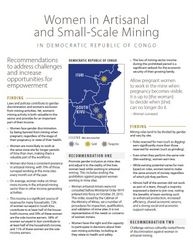
Women in ASM in DRC: Recommendations to address challenges
November 2017
This brief highlights key recommendations to address challenges women face in the artisanal mining sector in the Democratic Republic of Congo and increase opportunities for their empowerment.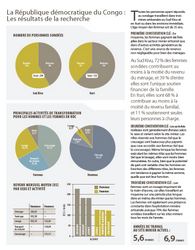
Women in Artisanal and Small-Scale Mining: Democratic Republic of Congo
July 2017
This brief highlights key findings of research studying the role of women in the artisanal mining sector. It provides a snapshot of challenges and opportunities for women’s empowerment in artisanal mining in the Democratic Republic of Congo. Only available in French.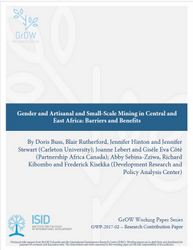
Gender and Artisanal and Small-Scale Mining in Central and East Africa: Barriers and Benefits
July 2017
A working paper produced on key findings of research into women and artisanal mining in the Great Lakes region, by Partnership Africa Canada, Carleton University, and Development Research and Policy Analysis Center for the Growth and Economic Opportunities for Women (GrOW) program.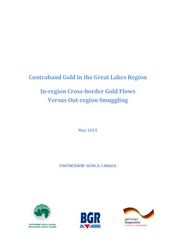
Contraband Gold in the Great Lakes Region: In-region Cross-border Gold Flows Versus Out-region Smuggling
May 2015
This report analyzes the artisanal gold flows within and out of the Great Lakes Region with the perspective of promoting responsible supply chain management in the context of the ICGLR Regional Initiative on Natural Resources and the OECD Due Diligence Guidance.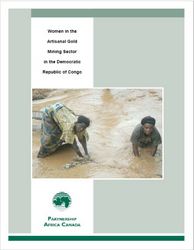
Women in the Artisanal Gold Mining Sector in the Democratic Republic of Congo
November 2014
Key findings from field research aimed at understanding the roles women play in artisanal gold mining in Democratic Republic of Congo. The research seeks to identify how the informal nature of the gold trade amplifies women’s vulnerabilities, as well as how the introductions of formalization and certification mechanisms could either present new opportunities or further contribute to their marginalization.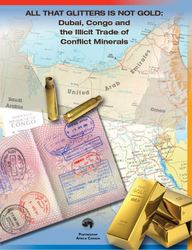
All That Glitters is Not Gold: Dubai, Congo, and the Illicit Trade of Conflict Minerals
May 2014
This report is a contribution to a growing body of research that seeks to better understand the illicit trade of gold and diamonds emanating from the Democratic Republic of Congo, and the role industry and state actors play – primarily in neighbouring countries and the United Arab Emirates – in facilitating this illegality.